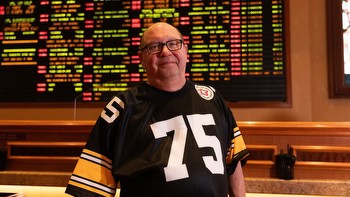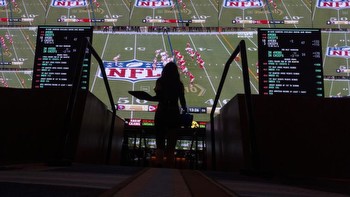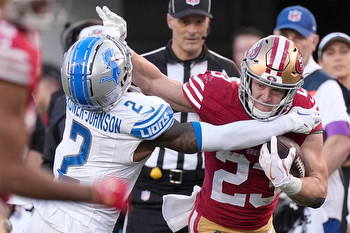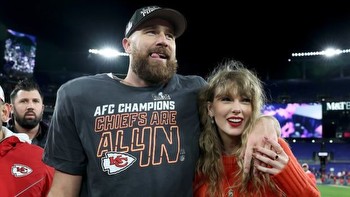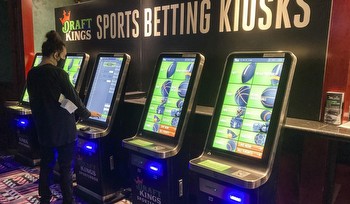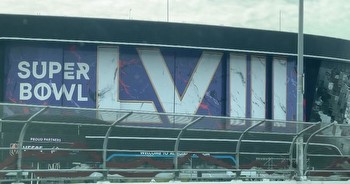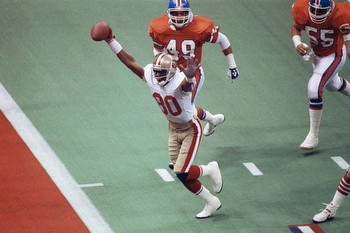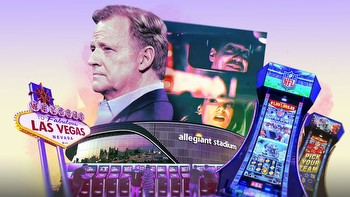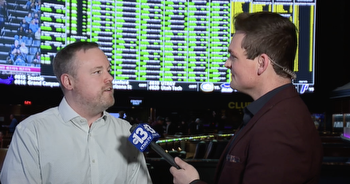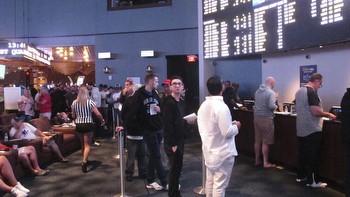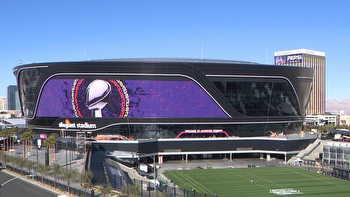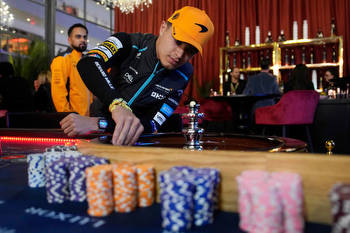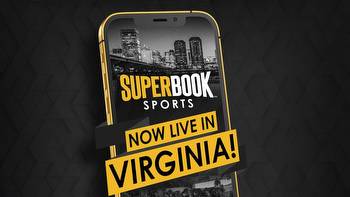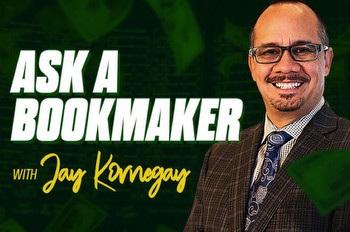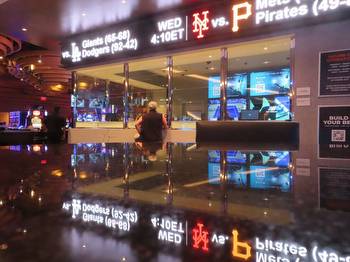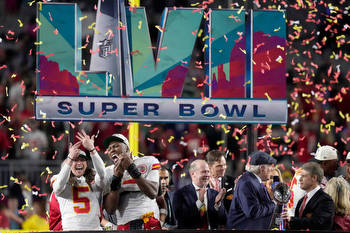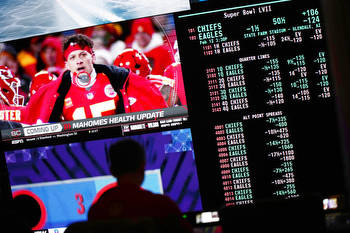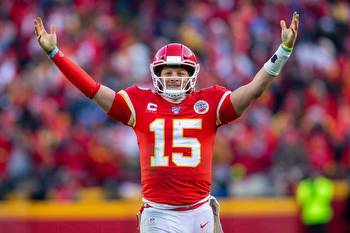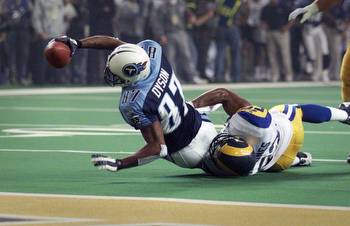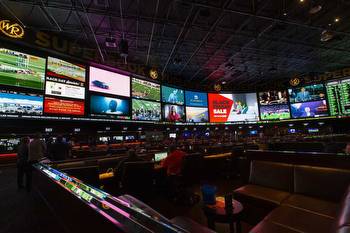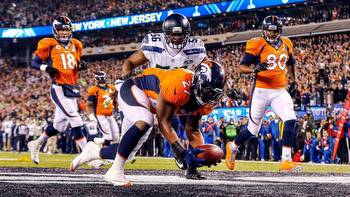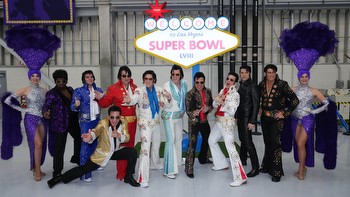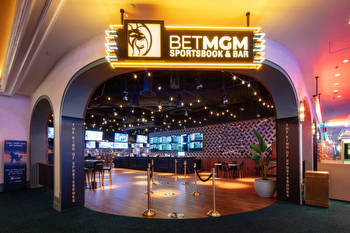Bettor Than Ever: Super Bowl, Sports Betting Ratchet Up Romance
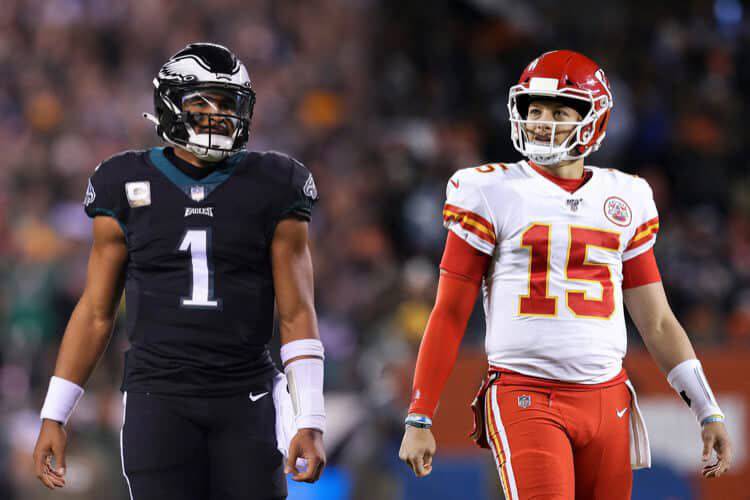
Sunday’s edition of the Super Bowl will be historic in a handful of ways, including being the first NFL title game to feature two Black starting quarterbacks and the first to be held in a state — in this instance, Arizona — with legal sports betting.
But by the time the 2025 Super Bowl reaches its conclusion, at least one of these milestones (and possibly both) will feel like business as usual.
After State Farm Stadium, home to a BetMGM sportsbook on its Great Lawn, hosts this year’s game in suburban Phoenix, consecutive Super Bowls will be played in Las Vegas and New Orleans — two cities in mobile betting states that are known for their tolerance for risk and revelry. The former municipality has long been America’s gambling mecca and sits in the only U.S. state in which someone could legally place a sports wager before PASPA was struck down in 2018. Meanwhile, the 2025 Super Bowl in New Orleans will be the first to be held in a stadium, the Caesars Superdome, bearing the name of a gaming company.
The three games present a tremendous opportunity to the sports betting industry in a climate where such wagering has become increasingly normalized. But with the prospect of reward comes tremendous responsibility, as well as a nagging concern that, if it’s not careful, the burgeoning industry might outkick its coverage.
‘A fascinating case study’
“I think this will be a fascinating case study in how U.S. audiences engage in betting during massive sports events,” said Brett Abarbanel, executive director of UNLV’s International Gaming Institute. “There is some research that shows that people who bet on sports have a higher engagement with the games themselves, and with an event the size of the Super Bowl, fans are primed to supplement their viewing experience with betting.
“The large amount of advertising that comes with the Super Bowl will also be reflected in gambling engagement. Last year, we started to see the major presence of gambling advertising during the Super Bowl broadcast, and the past year has seen a growth in betting discussions through the broadcast itself, too. I expect we’ll see that reflected in this year’s show, as well as the years to come.”
“When you’ve got in-stadium betting, it’s likely going to be heavily promoted,” said Keith Whyte, executive director for the National Council on Problem Gambling (NCPG). “You have the opportunity for negative outcomes — everything from unruly fans upset that a fumble just cost them a lot of money, harassment of players and officials, wild allegations that the game is fixed by somebody somehow.”
Whyte was quick to criticize Arizona for its choice “not to put any revenue from sports betting into gambling treatment” and warns of “a budding narrative that there’s too much promotion of gambling.”
“We’re hearing from members of Congress that there are too many gambling ads,” Whyte explained. “There are enormous opportunities to lean into responsible gambling and there are also enormous opportunities to feed into the backlash. The league, the clubs, the operators, the state government — are they going to try to use the opportunity to double down on responsible gambling or are they going to give ammunition to critics who are concerned about reckless oversaturation of advertising and too much gambling in sports? Those concerns are exactly what led to further restrictions in Australia and, in my opinion, what promoted the backlash in the U.K.”
To this end, an NFL spokesman told Sports Handle, “We understand how important it is that we use our platform to promote responsible betting” and referenced the league’s own multimillion-dollar “Stick to Your Game Plan. Always Bet Responsibly” partnership with the NCPG.
“We have ad caps to limit the number of legalized sports betting (LSB) ads during our games with the typical LSB ads coming in at right around under 5 percent of the total ads during a game,” the spokesman continued in an email. “Additionally, as was the case for the last few seasons, networks may reference betting lines in pregame shows (to help contextualize game analysis or a broader storyline, but not to analyze bets or make bet recommendations). Limited displays of betting lines in pregame shows are also permitted in graphics and tickers. The primary live game broadcasts do not include sports betting integrations.”
‘Born to host the Super Bowl’
Las Vegas resident Bill Krackomberger pays more attention to NFL football than about 99.9% of the population. In spite of this, Krackomberger says he has “zero interest in going to a Super Bowl.”
“That’s for the fans,” he said. “I’m not a fan of either team. I always resort to that Bronx Tale thing — ‘Mickey Mantle don’t care about you. Why should you care about him?’”
Krackomberger is able to maintain such a dispassionate stance because, unlike most fans, he is a professional sports bettor — and he’s salivating at the prospect of matching wits with the hordes of recreational bettors who will flood Las Vegas’ sportsbooks in 2024.
“I wish they had the Super Bowl here every year,” he said. “I would love to have all that square money coming into the sportsbooks right in town. To me, that would be the real upside. Everyone has a bet on the Super Bowl.”
For this year’s game, Krackomberger said he’ll be heading east to place some bets in Boston and Atlantic City before arriving back in the desert either the night before or the morning of the game. As far as his betting strategy is concerned, he revealed, “You want to bet your overs on player props early and your unders more toward game time, especially this year. I am hoping there’s going to be tons of liquidity on the unders day of game. I literally will bet 80% of my bets on the day of the game.
“You have many, many states taking bets, and everybody loves to bet the over. In volume, they’re gonna have to get some money on the under on these players. If the books don’t put lines on there to get money on the other side, they’re gonna get hurt. They’re going to need guys like me to bet the under.”
Jay Kornegay, the executive vice president of race and sportsbook operations at Las Vegas’ Westgate SuperBook, agrees with Krackomberger’s assessment.
“The Super Bowl is the one event where recreational money dominates the overall handle,” he said. “Does that give sharps and educated players opportunities? Yes, but to our benefit. As bookmakers, we can get lopsided on some of these propositions, and it’s the sharps that will bet the opposite side of the recreational players that help balance us out.”
The SuperBook has expanded its presence to other states, including Arizona. Hence, like many sportsbook operators, it will have a tent on Radio Row, where SuperBook staffers will “be giving out swag, answering questions, and signing people up” for mobile sportsbook accounts, according to Kornegay.
“I look at it from a Las Vegas perspective, where we’ve had sports betting and mobile betting for eight years here,” said Kornegay. “Fans have been able to enjoy the events and have had the ability to wager before and during the game. So it’s kind of old hat for us. But I do believe it’s something that should be discussed because I’d like to see how the fans react. I think it’s another level of entertainment for them. Sometimes wagering on the end of the game enhances the entertainment value of a game that’s a blowout. It’s like, ‘Let’s go. I’ve got the Eagles plus-14. Hold on.'”
Kornegay and his staff are already preparing for the 2024 spectacle, which will be like few Vegas has ever seen.
“The numbers we will see for next year’s Super Bowl will surpass anything we’ve seen in our past — hotel rates, food and beverage, flights, you name it,” he said. “We were really born to host the Super Bowl.”
Market maturity and a familiar field
Just as sports betting is old hat for Vegas, so too is hosting a Super Bowl for New Orleans. The 2025 edition of the game will be, believe it or not, the 11th time a Super Bowl has been played in the Crescent City, with eight of those games occurring in the Superdome.
Caesars now owns the naming rights to that fabled stadium and features the Manning family of Southern-bred quarterbacks (and Cooper!) as its primary spokesmen.
“If they really lean into responsible gambling in 2025 and you’ve got the Mannings doing their thing, they could really change the narrative,” said Whyte. “From an operator standpoint, the same sort of money they put into marketing single-game parlays, I’d love to see them use to get customers to use bet-limit features. These sorts of public education campaigns should be similar in scale and scope to campaigns around drunk driving, bullying, opioids. It’s that large of a problem and it needs to be that large of a solution.”
Abarbanel concurred, saying, “I don’t consider negative outcomes like problem gambling to be as tied to the Super Bowl being held in sports betting states, but rather to the broader growth and exposure of sports betting through the large amount of advertising and promotion that come from an event of this size and scope. This makes it all the more important that the advertising blitz connected with events like the Super Bowl are accompanied by concerted responsible gambling messaging and efforts to help make sure that betting enhances the fun elements of sports, without driving or triggering problematic issues.”
In assessing how valuable it will be for Caesars to have its name splashed on the Superdome come 2025, Abarbanel said, “The market will definitely have matured quite a bit in the next two years, and a large amount of customer acquisition dollars will have been spent. I don’t think we’ll see the naming rights as a major driver of new customer acquisition, though I expect the name recognition will be helpful in the same manner as other named stadia and may help in converting customers from competitors.”
When asked to name potential positive outcomes that could result from the Super Bowl being held in states with legal sports betting, Abarbanel replied, “I think it will be an excellent opportunity to showcase how game integrity can be maintained through appropriate monitoring channels, even in the presence of gambling. This was long a concern of various sports organizations regarding the legalization of sports betting in the U.S.”

